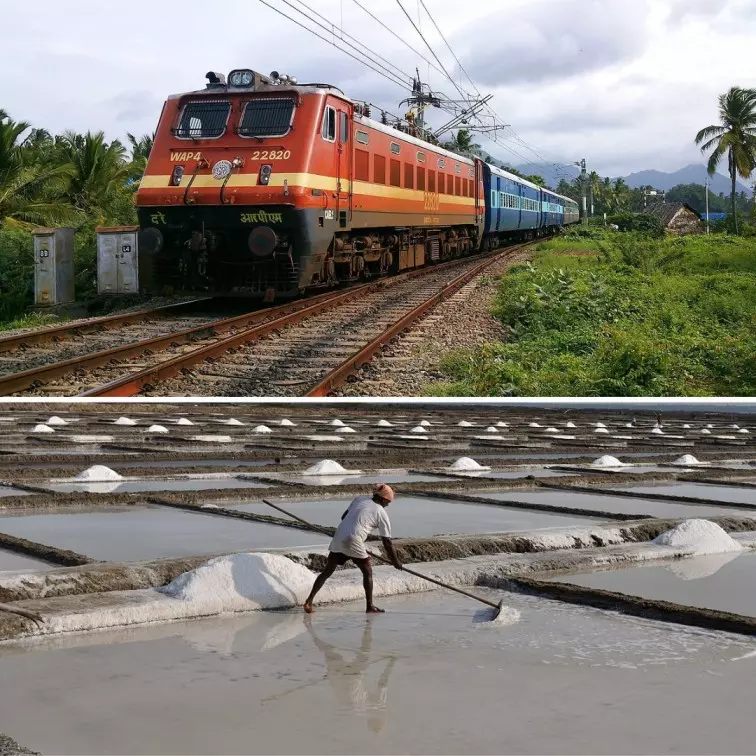MNNIT To Create Glass Fibre Freight Wagons For Indian Railways, To Be Used For Transporting Salt
Writer: Hardik Bhardwaj
He is a student of SIMC, who is organized and able to meet deadlines in a fast-paced environment.
Uttar Pradesh, 20 Jan 2023 10:00 AM GMT
Editor : Jayali Wavhal |
She writes about gender issues, human interest, and environment.
Creatives : Hardik Bhardwaj
He is a student of SIMC, who is organized and able to meet deadlines in a fast-paced environment.
The wagons, which will be developed under the guidance of the divisional railway manager of Central Railway at Xyron in Bhopal, will be about 10 per cent lighter than the current steel wagons.
For the first time, a group of researchers at Motilal Nehru National Institute of Technology (MNNIT) in Allahabad will develop corrosion-resistant and lightweight freight cars for the Indian Railways. According to MNNIT officials, the freight wagons developed by the institute will be used for transporting salt.
MNNIT officials informed that the freight wagons will be constructed using Glass Fibre Reinforced Polymer (GFRP) and will be significantly lighter in weight compared to the current material used for transporting salt, which is utilized both in households and industries.
Partnership With Indian Railways
The head of the project is Professor Mukul Shukla, a senior researcher from the mechanical engineering department of the institute. He will work alongside Ashutosh Upadhyay, associate professor, and Ashutosh Mishra, assistant professor from the applied mechanics department of MNNIT.
The researchers from MNNIT obtained the project through the Innovation and Startup Portal of Indian Railways. The wagons will be developed in partnership with Xyron Technology in Bhopal, a company founded by an alumnus of MNNIT, Abhinav Bhatnagar, who graduated from the institute in 2000. Professor Shukla stated that the project was proposed as a solution to one of the 15 problems listed by Indian Railways' Innovation and Startup Portal, which invited project submissions for solutions. He added that the team proposed the development of wagons constructed from glass fibre as a solution.
Professor Shukla also mentioned that according to the rules of the startup portal, the funding for the project would be split 50/50, with Xyron Technology investing ₹1.3 crore and Indian Railways investing an equal amount, as reported by Hindustan Times.
MNNIT Director Professor RS Verma stated that recently the institute had received funding for many more innovative projects from different organizations. He added that in the near future, the main goal of MNNIT is to improve its research, consulting, and innovative contributions to achieving higher rankings at a national level through its talented faculty and students.
Light, Non-Corrosive, Long-Lasting
The wagons, which will be developed under the guidance of the divisional railway manager of Central Railway at Xyron in Bhopal, will be about 10 per cent lighter than the current steel wagons. This weight reduction will increase the railway's carrying capacity, as trains equipped with these wagons can travel at faster speeds.
Professor Shukla also said that while the cost of the wagons will be about 20 per cent more than the current wagons, these wagons have a lifespan of 25-30 years, compared to the present wagons, which have a lifespan of 18-20 years. 'The wagons made of fibre, being non-corrosive, will not cause rust in the tracks,' he added.
Indian Railways is one of the largest railway networks in the world, and the use of these new wagons is expected to significantly impact the transportation industry. Not only will it increase fuel efficiency and reduce costs, but it will also help reduce carbon emissions and promote sustainable transportation.
Also Read: Towards Innovation! Team Of 19 Students From MNNIT Develops Driverless Car 'CART-95'
 All section
All section















